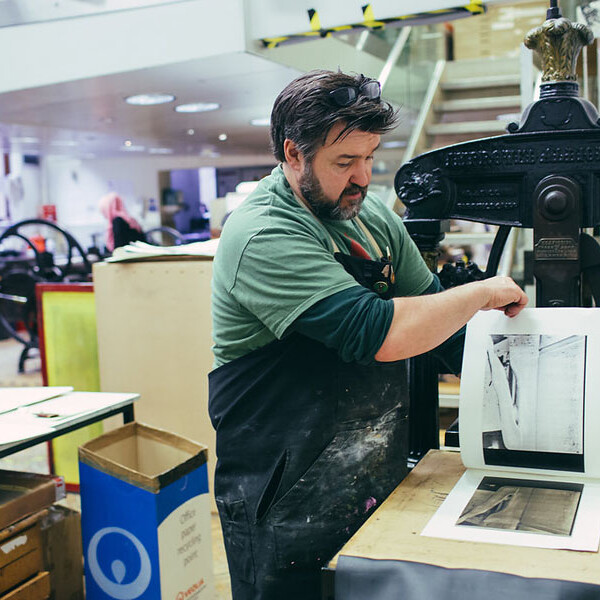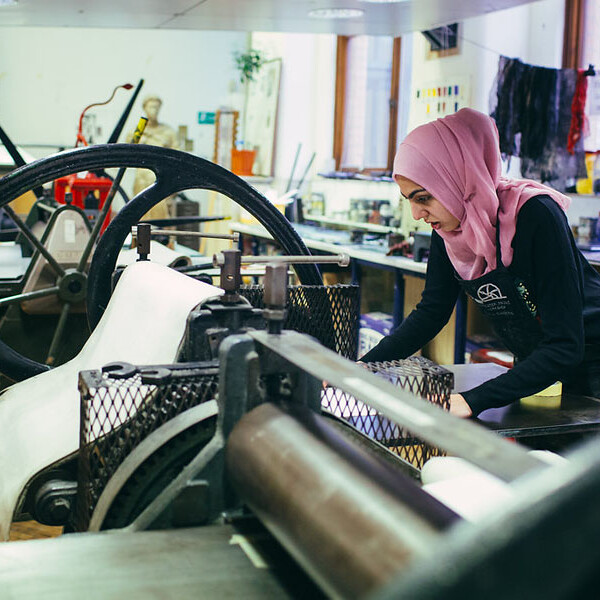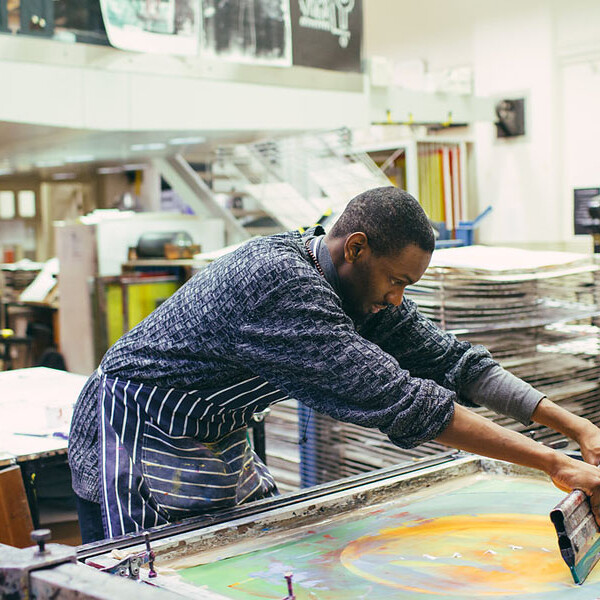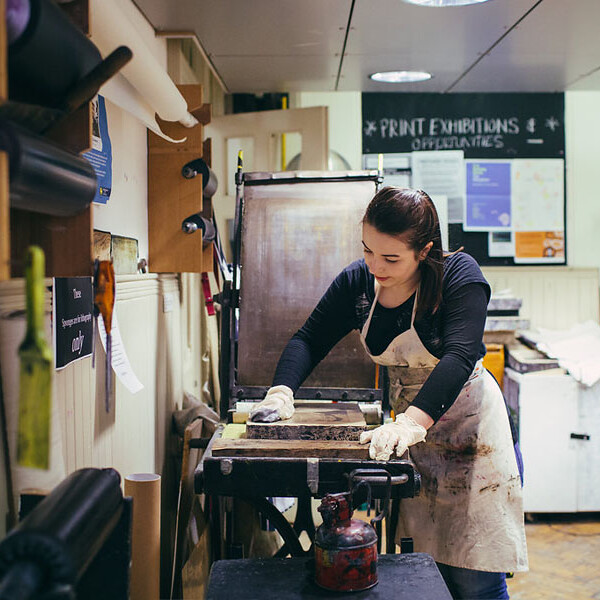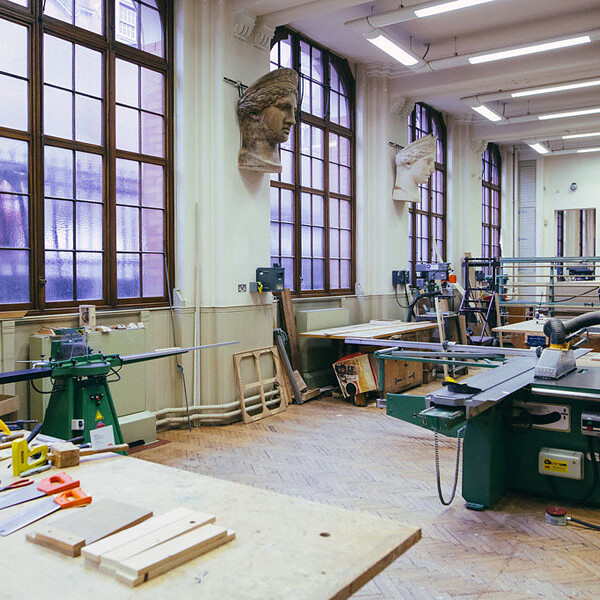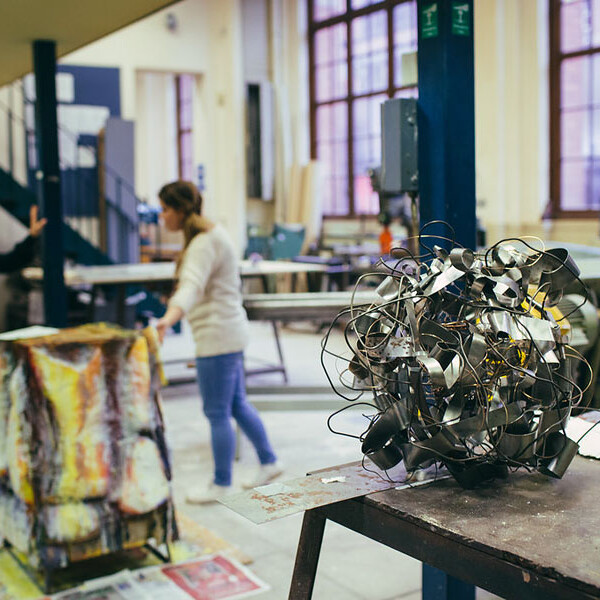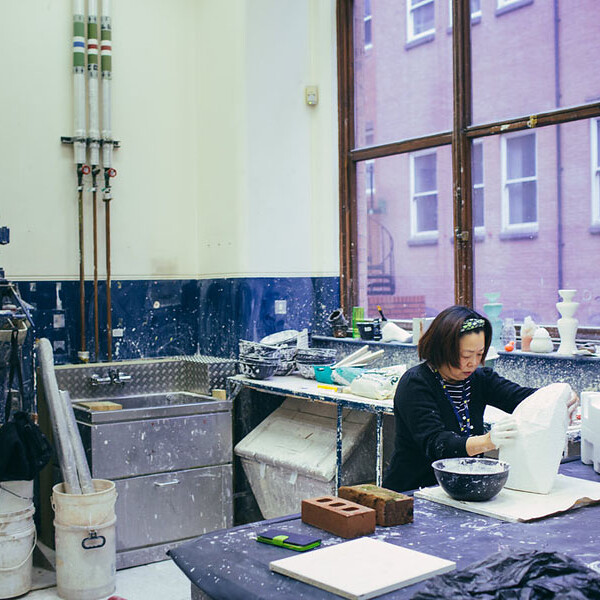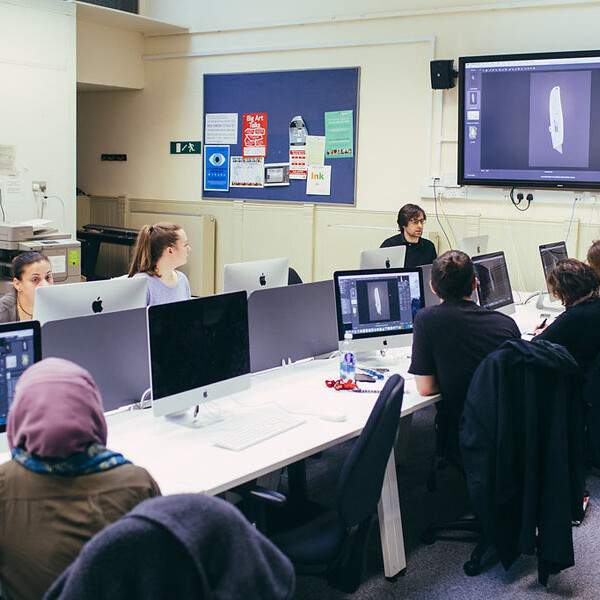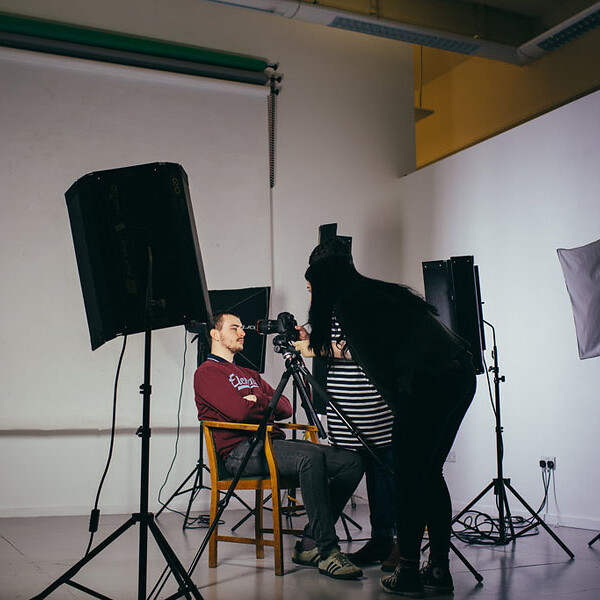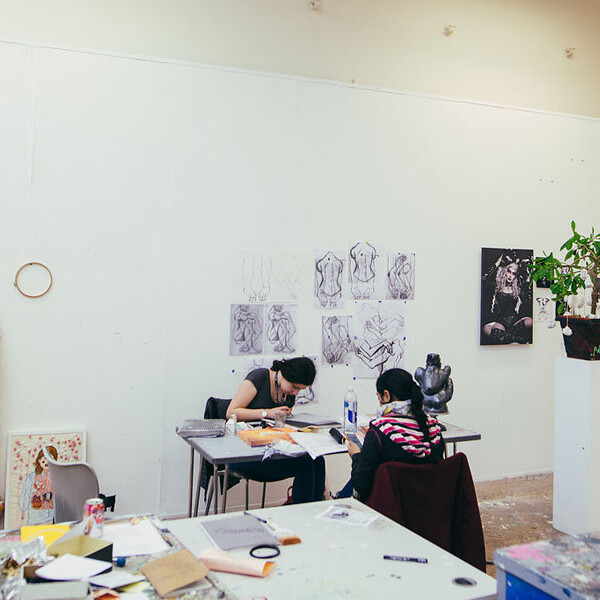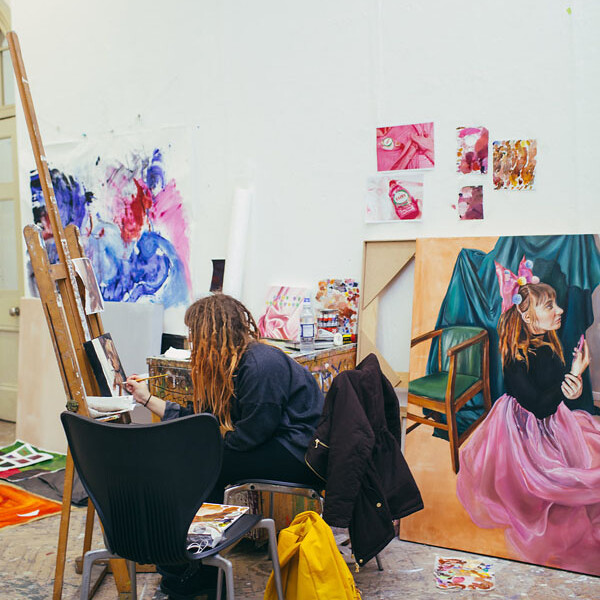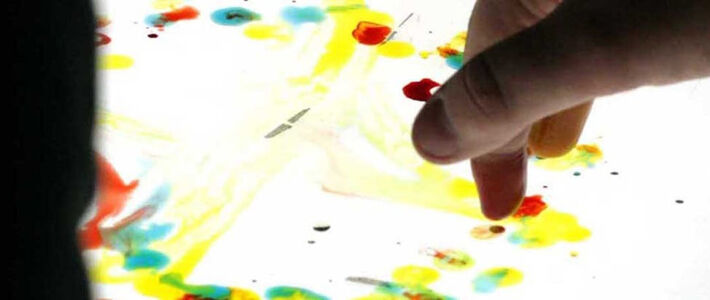
Art and Design - BA (Hons)
Currently viewing course to start in 2025/26 Entry.
Maker? Thinker? Futurist? Coder? Performer? Technologist? Conservationist? Designer? Interested? Our new hybrid BA (Hons) is a course for the future, where you will explore the intersection of art and design to create your career in the evolving creative industries....
- Level Undergraduate
- Study mode Full Time
- Award BA (Hons)
- Start date September 2025
- Fees View course fees
- Subject
- Location Margaret Street
This course is:
Available with Professional Placement year
Open to International Students
Overview
This course offers a Creative Technologies pathway
This optional pathway will give you the opportunity to focus specifically on developing your digital skills. You can choose this pathway at the start of your studies, or transfer over to the pathway at the end of each academic year. Read more about the Creative Technologies pathway
Maker? Thinker? Futurist? Coder? Performer? Technologist? Conservationist? Designer? Interested?
Our new hybrid BA (Hons) is a course for the future, where you will explore the intersection of art and design to create your career in the evolving creative industries.
Many innovative creative studios now define themselves as interdisciplinary, a word which defines the fluid movement across the fields of art, design and technology. Rather than specialising in a particular creative discipline, our cutting-edge course reflects how these studios practice by exploring the intersection between art and design, with the implementation of new creative digital technologies.
What's covered in this course?
I looked all over the world for a course that would let me experiment and learn with my different interests in art and design and found that there is no course quite like this one. Even though my peers and I are all doing the same course we learn and develop different things because this course supports us through our unique interests and prepares us for our future. Centred around collaboration, with just one year on the course I can already see my confidence growing not only towards my profession but how I present myself and interact with people in everyday life.
Helen Parmenter, International Student, Level 5
Our course will prepare you to be ready for employment within the creative industries by providing you with long-term creative skills to map out your creative future. With you at the centre, we will explore the intersections of art and design, providing a space where you can understand, develop and create a career in the evolving creative industries. You will develop the necessary self-awareness to question, make, play and create with others.
The versatility of our experimental studio environment will enable you to explore the necessary collisions that innovative ideas creation now requires, while enhancing a range of core skills including design thinking, creative problem-solving, collaboration, communication, and making. We encourage collaborative practice and offer a cross-level learning approach, meaning you can work with students across all years of the course to create projects and share ideas.
Whether you choose to combine creative coding with sensors, interactive design with projection mapping, 3D scanning and VR or interactive live performance with sound and light, you will respond to live briefs set by real-life clients. Students have worked on local, national and global creative briefs, from working on immersive installations at Boomtown Festival, to virtual portals with Chicago and Kyiv in the Metaverse. You will get a wide range of experience working on live briefs in both real and virtual environments.
The flexible, student-centred approach to the curriculum, informed by professional practitioners, will enable you to be imaginative, confident and convincing in designing and shaping your role in tomorrow’s free flowing, boundary free creative industries.
Creative Technologies Pathway
All students will be introduced to the fundamentals of interdisciplinary art and design practice with a focus on new creative technologies, which forms the core ethos of this course. In line with the development of our digital futures we are introducing an optional pathway in Creative Technologies which will give you the opportunity to focus specifically on further developing your digital skills through a breadth of technological approaches.
If you choose the Creative Technologies pathway you will cover the same curriculum, but will opt for technology-based outcomes. You will be assessed in relation to your exploration, questioning and use of a range of contemporary digital technologies and your creative applications in relation to the module theme. Work may still embrace a sense of physicality but the focus will retain an element of Creative Technologies. You can either choose the Creative Technologies pathway at the start of your studies, or transfer over to the Creative Technologies pathway at the end of each academic year.
At the end of each year, during feedback with tutors, you can transfer over to the Creative Technologies pathway, but you will be required to evidence 80% engagement with the weekly Creative Technologies workshops, which you will document on a digital platform ‘Workshop Log’. If you have not engaged in workshops to 80%, you will need to evidence sufficient engagement over the summer.
Following the Creative Technologies pathway has allowed me to explore and embrace the intersection of art and technology. The lecturers present us with exciting outcomes I had not previously considered, despite my prior interest in tech. Collaborating with other students allows us all to stay engaged with the challenges technology presents.
Lewis Owen, Level 6
Professional Placement Year
This course offers an optional professional placement year. This allows you to spend a whole year with an employer, following successful completion of your second year, and is a great way to find out more about your chosen career. Some students even return to the same employers after completing their studies.
If you choose to pursue a placement year, you will need to find a suitable placement to complement your chosen area of study. You will be able to draw on the University’s extensive network of local, regional, and national employers, and the support of our Careers teams. If you are able to secure a placement, you can request to be transferred to the placement version of the course.
Please note that fees are payable during your placement year, equivalent to 20% of the total full-time course fee for that year.
I fully support the approach to cross-disciplinary teaching, using art, design and digital technology to explore design methodologies. There is a strong emphasis on collaboration, experience and preparing students for future employability – I think this is extremely important.
Jason Bruges, Founder of Jason Bruges Studio.
Why Choose Us?
- Sector-leading studio space
Our sector leading studio space features an extensive range of cutting-edge and unique equipment, enabling you to create a wide range of projects. - Specialist kit
You will have access to all technology in our studio including a 3D printer, kinetic robots, VR headsets, drone, audio, Arduino and Adafruit circuit boards and much more. - Future careers
Potential career paths include: immersive and interactive art and design; production, experiential and spatial design; product, costume, and games design; and, so many more. - Unique briefs
Students have worked on unique and interesting live local, national and global briefs. Including working with Midlands Art Centre, Boomtown Music festival, Oval Real Estate, as well as collaborations with Kyiv National University of Technology and Design and University of Chicago. - Professional partnerships
We have strong relationships with artists and studios including Jason Bruges Studio, BOM, Antonio Roberts, Camille Baker, and many more.
Open Days
Join us for an Open Day where you'll be able to learn about this course in detail, chat to students, explore our campus and tour accommodation. Booking isn't open for this event yet, register your interest and we'll let you know as soon as booking goes live.
Next Open Day: 28 June 2025
Entry Requirements
These entry requirements apply for entry in 2025/26.
All required qualifications/grades must have been achieved and evidenced at the earliest opportunity after accepting an offer to help confirm admission and allow for on-time enrolment. This can also include other requirements, like a fee status form and relevant documents. Applicants can track their application and outstanding information requests through their BCU mySRS account.
Essential requirements
- Standard offer: 112 UCAS Tariff points. Learn more about UCAS Tariff points.
- Accelerate offer: 80 UCAS Tariff points. Find out more about BCU Accelerate.
Applicants will also need to submit a good portfolio.
If you have a qualification that is not listed, please contact us.
Don’t meet our entry requirements?
You could apply for a foundation course or a course at our International College. These routes have lower entry requirements and act as the bridge to a full degree. To find out more, please select your status:
Fees & How to Apply
UK students
Annual and modular tuition fees shown are applicable to the first year of study. The University reserves the right to increase fees for subsequent years of study in line with increases in inflation (capped at 5%) or to reflect changes in Government funding policies or changes agreed by Parliament. View fees for continuing students.
Award: BA (Hons)
Starting: Sep 2025
Pathway: Art and Design
- Mode
- Duration
- Fees
- Full Time
- 3 years
- £9,535 in 2025/26 ✱ Important note for this price
- Apply via UCAS
Award: BA (Hons)
Starting: Sep 2025
Pathway: Art and Design with Creative Technologies
- Mode
- Duration
- Fees
- Full Time
- 3 years
- £9,535 in 2025/26 ✱ Important note for this price
- Apply via UCAS
(↩Back to price) * The Government is proposing to increase the cap on full-time regulated tuition fees to £9,535 for 2025/26 and the University is planning on increasing fees to that maximum level once legislation is enacted. Part-time fees are charged pro-rata, where applicable.
International students
Annual and modular tuition fees shown are applicable to the first year of study. The University reserves the right to increase fees for subsequent years of study in line with increases in inflation (capped at 5%) or to reflect changes in Government funding policies or changes agreed by Parliament. View fees for continuing students.
Award: BA (Hons)
Starting: Sep 2025
Pathway: Art and Design
- Mode
- Duration
- Fees
- Full Time
- 3 years
- £17,690 in 2025/26
Award: BA (Hons)
Starting: Sep 2025
Pathway: Art and Design with Creative Technologies
- Mode
- Duration
- Fees
- Full Time
- 3 years
- £17,690 in 2025/26
Guidance for UK students
UK students applying for most undergraduate degree courses in the UK will need to apply through UCAS.
The Universities and Colleges Admissions Service (UCAS) is a UK organisation responsible for managing applications to university and college.
Applying through UCAS
- Register with UCAS
- Login to UCAS and complete your details
- Select your course and write a personal statement
- Get a reference
- Pay your application fee and submit your application
Guidance for International students
There are three ways to apply:
1) Direct to the University
You will need to complete our International Application Form and Equal Opportunities Form, and submit them together with scan copies of your original academic transcripts and certificates.
2) Through a country representative
Our in-country representatives can help you make your application and apply for a visa. They can also offer advice on travel, living in the UK and studying abroad.
3) Through UCAS
If you are applying for an undergraduate degree or a Higher National Diploma (HND), you can apply through the UK’s Universities and Colleges Admissions Service (UCAS).
You can request a printed form from your school or nearest British Council office. You will be charged for applying through UCAS. Birmingham City University’s UCAS code is B25 BCITY.
Portfolio guidance
If you receive an offer to study this course, you will be required to submit a portfolio. We ask that this is submitted within four weeks of receiving your offer.
Please see our portfolio guidance page for tips on putting your portfolio together.
Portfolio guidance
If you receive an offer to study this course, you will be required to submit a portfolio. We ask that this is submitted within four weeks of receiving your offer.
Please see our portfolio guidance page for tips on putting your portfolio together.
Personal statement
UK / EU students are required to submit a personal statement as part of their application for this course.*
The personal statement gives you a crucial opportunity to say why you’re applying and why the institution should accept you.
Here are the key areas you’ll need to address:
- Course choice - Why does this course appeal? What areas are of particular interest?
- Career plans - If you have a specific career in mind, say how your chosen course will help you pursue this goal.
- Work experience - Mention any work that is relevant to your subject, highlighting the skills and experience gained.
- School or college experience - Highlight skills gained at school/college, eg summer schools or mentoring activities.
- Non-accredited skills or achievement - eg Duke of Edinburgh Award, Young Enterprise scheme.
You should also mention your future plans – if you’re planning to take a year out, don't forget to give your reasons. Talk about any subjects you’re studying that don’t have a formal assessment and any sponsorships or placements you’ve applied for. And don't be scared to add in details about your social, sports or leisure interests.
Worried about Personal Statements?
If you've got no idea where to start or just want to check you're on the right track, we’ve got expert advice and real examples from our students to help you nail your personal statement. You can even download our ultimate personal statement guide for free.
*Non-EU students are not required to submit a personal statement when applying for this course.

Financial Support
We offer further information on possible undergraduate financial support. This includes the type of loans, grants and scholarships available both from the government and from Birmingham City University.
Course in Depth
First Year
In order to complete this course you must successfully complete all the following CORE modules (totalling 120 credits)
This module introduces critical thinking and building self-awareness to create a community. Through group discussions and debate you will be supported to develop learning strategies. You will be introduced to creative design thinking, verbal and visual communication tools, and core writing skills. You will look at a body of thoughts from across the world, capturing a global, diverse range of voices.
This module explores the connectivity of materials, and how materials collaborate with each other. You will collaboratively test, experiment and prototype, by exploring: fusion; confusions; knotting; welding; embedding; joints; and breaking things. You will look at a body of materials and their applications from across the world, capturing a global, diverse range of voices.
This module explores the fundamentals of, and interconnective relationship between, different contemporary creative digital technologies. You will collaboratively experiment, test and embrace digital technologies, by exploring: coding; digital modelling; digital drawing; projection; filming; editing; VR/AR; sound; and, light. You will look at a body of technologies and their applications from across the world, capturing a global, diverse range of voices.
This module focuses on narrative, the different ways narratives can be created, and the possible exploration of: movement; performance (of materials or a person); presentation; spoken word; animation; costume; or set. You will look at a body of performance from across the world, capturing a global, diverse range of voices.
This module focuses on making, using found materials in the natural environment. The module will explore a range of possible themes, including: natural materials; foraging; growing; building; stone carving; nesting; thatching; collecting; or observing. You will look at natural materials and their application across the world, capturing a global, diverse range of voices.
This module is a round-up of the year, revisiting and building on what has been done to date. You and your peers will self-organise to look out to the wider community of Birmingham and collaboratively identify, develop and design speculative proposals. The module, and the year, will culminate with an outward-facing exhibition.
Second Year
In order to complete this course you must successfully complete all the following CORE modules (totalling 100 credits)
This module provides an opportunity for you to apply your knowledge and skills to an external, professional brief. The brief will be set by a local external client, user, community or audience, in consultation with the staff team, and it could be a ‘real life’ problem to be solved, or a simulation. It is an opportunity for you to engage in a professional manner, within the supportive infrastructure of the University. Where appropriate, the project may involve interdisciplinary collaboration with students from other courses. In this way, it reflects the collaborative, flexible nature of employment within the creative industries.
This module explores real-world challenge-based learning, through a nationally located live brief, set by an external client, partner, user, community or audience. The module will have an employability focus, an emphasis on building professional communication skills, and you will expand your knowledge of interdisciplinary design practice across the creative industries.
This module focuses on real-world challenge-based learning, through a globally located live brief, set by an external client, partner user, community, audience or institution. Building on the skills developed in the previous modules throughout year two, this module has a global perspective, and an emphasis on Global Citizenship, understanding different cultures, knowledge and working practices.
In order to complete this course you must successfully complete at least 20 credits from the following list of OPTIONAL modules:
This module is an opportunity to learn and critically reflect on the skills of collaboration by enabling you to create an interdisciplinary project with students from complementary disciplines, or with academic staff. Collaboration is a vital employability skill within the creative industries and this module allows you to develop these skills, making use of University facilities and with the support of academic staff.
The purpose of this module is to enable you to develop professional attributes and subject skills through experience in the work place, and to critically reflect upon your learning in that context. You will normally be expected to arrange your own placement, with support from academic staff and ADM Careers+. Typically, the placement duration is a minimum 70 hours, maximum of 140 hours. This can be achieved in one block, or can be dispersed over a longer period of time, if required. If you fail to secure a placement by the specified deadline, an “as live” industry standard project will be set by the module tutor. The work placement will be considered and approved by the module tutor in order to ensure that the learning opportunity is of benefit to you.
You also have the option to study a semester abroad:
A semester abroad is a fantastic opportunity to explore your subject in an international context at one of our partner institutions. Spending a period of time abroad as part of your degree allows you to understand a different culture, and gain specific knowledge about working practices in your host country. Connecting with fellow international students can broaden your network and increase your graduate prospects.
If you choose this option, you will study 60 credits of modules at the overseas partner institution and fewer modules at BCU.
Core modules are guaranteed to run. Optional modules will vary from year to year and the published list is indicative only.
Professional Placement Year (Optional)
In order to qualify for the award of BA (Hons) Art and Design with Professional Placement Year a student must successfully complete the following module.
This module is designed to provide you with the opportunity to undertake a credit bearing, 40- week Professional Placement as an integral part of your Undergraduate Degree. The purpose of the Professional Placement is to improve your employability skills which will, through the placement experience, allow you to evidence your professional skills, attitudes and behaviours at the point of entry to the postgraduate job market. Furthermore, by completing the Professional Placement, you will be able to develop and enhance your understanding of the professional work environment, relevant to your chosen field of study, and reflect critically on your own professional skills development within the workplace.
Final Year
In order to complete this course you must successfully complete all the following CORE modules (totalling 60 credits)
The purpose of this module is to enable you to undertake a sustained, in-depth and theoretically informed research project exploring an area that is of personal interest to you. You will be guided towards choosing a research topic, which is relevant to your discipline and in which your lecturers have expertise.
In this module you will investigate the wider creative industries, locally, nationally and globally, to better understand what your potential future pathway might look like. In response to a series of supporting lectures from a range of industry experts, you will develop your professional identity by constructing a range of appropriate self-promotional materials.
Plus one of the following CORE modules (totalling 60 credits):
This module is tailored to your individual strengths, research areas and career aspirations. You will follow your own pathway to make a body of work, navigating your way through the Thought Lab, Materials Lab and Digital Lab. This could be achieved individually, or in collaboration with others, using an external live brief or a speculative brief.
This module is tailored to your individual strengths, research areas and career aspirations. You will follow your own pathway to make a body of work, navigating your way through the Thought Lab, Materials Lab and Digital Lab. This could be achieved individually, or in collaboration with others, using an external live brief or a speculative brief.
This course focuses on rapid learning and experimentation, and you will engage in real-world challenges. The course will enable you to question, explore, experiment, make, play and create with others.
Year One
Level 4 takes you and your peers from ‘I to Us’ to harness your self-awareness as part of how you learn and collaborate with others in your teams. You will navigate through ‘Labs’ that represent the fundamentals of interdisciplinary design process (defined as ‘between’ or ‘among’ defined disciplines). The term ‘Lab’ is used to communicate that the studio environment will be a place of experimentation. We define Lab as ‘a creative environment that encourages experimentation, play, risk-taking and making a mess.’
The three primary Labs are: Thought Lab; Materials Lab; and Digital Lab. You will iteratively move through these Labs in the first semester. Additional Labs will be introduced once the fundamentals of the interdisciplinary design process have been established. These new Labs are: Nature Lab; Performance Lab; and, Speculative Lab. What will connect them all is a sense of community and communal sharing. Throughout the module you and your peers will regularly bring your work together to share, display, discuss, and critique.
Throughout the course you will be asked to ‘creatively interrogate’ by examining, questioning, and then making a response to a given source, theme or object. These challenges are designed to expose you to new approaches to ‘sense making’ while considering different perspectives and different voices.
I like how the course doesn't limit your creativity, and the outcome can be anything you are interested in. Creative Technologies broaden your work even more, allowing you to experiment as much as you want, try new things and learn from mistakes. The course changed my perception of how important collaboration is, even though it might be hard sometimes, it shows you real life and prepares you for the future.
Oleksandra Khaliapina, Level 5
Year Two
Level 5 uses the emergent process developed in Level 4 to move you and your peers from ‘Us to We’, from working with each other to working as a unit with external clients. You will focus on real-world challenge-based learning, through live briefs that are locally, nationally and globally located, set by an external client, user, community or audience. Building on skills developed in the previous module, the scope is now bigger, with broader perspectives, an employability focus, and an emphasis on building professional communication skills. You will collaboratively question and explore a live brief, while iteratively moving through the Thought, Materials and Digital Labs as needed as your projects grow and develop.
Upon joining the Art and Design with Creative Technologies course, I was unsure what to expect. The broad range of briefs and the chance to play with a vast range of mediums began as quite a challenge. However, in my final year of the qualification I can confidently say that this course has provided me with a flexible skillset and industry experience like no other. From live briefs with real clients to learning the importance collaborative practices, this course offers real opportunity for growth, exploration, and imagination. All of which is backed by realistic insights into today's creative industries.
Zoe Cheshire, Level 6
Year Three
Level 6 encourages you to diverge to follow your own pathway, navigating your own way through the Labs. You may focus on one Lab, or a combination of Labs, or create new Labs of your own. You may choose to work individually or collaboratively. You will undertake a sustained, in-depth and theoretically informed research project exploring an area of personal interest, and you will create a body of work. You will also integrate professional companies and the creative landscape to identify a future career path and develop a professional identity.
Go Abroad
Undergraduate students can apply to study on an exchange programme for one semester at one of our partner universities across the globe. The opportunity to apply will depend on which course you study. The majority of courses offer this in the second semester of your second year. You will obtain credits which are recognised by BCU. Find out more about Go Abroad.
Alternatively, each year, the University offers students the chance to volunteer or study overseas at one of our partner institutions/organisations during the summer. In previous years, our students have been to France, Spain, Brazil, Fiji, India, Mexico, South Korea, and USA on a variety of activities. All students are eligible to apply, although PG and PhD students may require academic approval. Find out more about Go Abroad.
Trips and visits
You may have the opportunity to participate in a placement, external projects and go on national and international study visits.
In previous years international trips have included visiting the Venice Biennale, New York, Berlin and Barcelona. National trips have included visits to London, Liverpool and Bristol.
Download course specification
Employability
Enhancing employability skills
Our course seeks to respond to the rapidly evolving creative industries, to enable you to not only be ready for immediate employment, but also for future evolutions within the industries, by providing you with long-term skills and employability. Informed by professional practitioners and researchers, the course reflects pioneering practices that cross art, design, and creative technologies. The course will enable you to be imaginative, confident and convincing in taking up and even designing and shaping your future role as a creative leader and practitioner of change.
The course offers strong employability potential for students as the Digital Creative sector is the largest growth sector of the creative industries. All skills and capabilities developed on the course are highly transferable and will support you to develop a range of knowledge, skills, behaviours attributes and attitudes which will enable you to be successful not just in employment but in life. The breadth and fluidity of the course will enable you to build an awareness and development of the following transferable skills: adaptability; creativity; collaboration; problem solving; communication; listening; analytical reasoning; critical thinking; attention to detail; and, writing.
Key employability skills will also be acquired through:
- Working on live briefs with real clients in an employment context, enabling you to collaborate, communicate effectively, build social skills and develop a global perspective.
- The option of a work placement module, professional placement year, and multiple live briefs will be offered with potential employers as real partners in learning.
- A Personal Tutor will help you reflect on your employability.
- Employability Leads, Academic Supervisors, Careers Advisors and Graduate Plus Teams will be able to provide support and advice.
Graduates will leave this course not only ready for immediate employment, but also for future evolutions within the creative industries, and with long-term skills to meet the challenges of the 21st Century as Thinkers + Makers + Technologists.
Graduates may:
- Go straight into industry as an employee or freelancer, moving fluidly across a broad range of disciplines, for example as Production Designers, Games Designers, Toy Designers, Stage Designers, or New Media Artists. Or they may join creative studios that explores art, design, engineering, and technology.
- Become entrepreneurs or business start-ups creating interdisciplinary design studios, possibly with their peers and industry networks.
- Go into further study, either on a more specialised MA course, or a teaching training PGCE Art and Design course.
Placements
As a student on our BA Art and Design course you will be offered the choice of taking one of the ADM Faculty Modules. Each module will have a live focus whether that be working across the City collaboratively with students from across the Faculty, working within industry in work experience placements or working on live project briefs.
You will have the option to take a year-long professional work placement sandwich year to spend time directly working in industry through our BA (Hons) Art and Design with Professional Placement Year. This presents a fantastic opportunity to gain confidence, build experience and develop workplace skills before graduating through a work-based learning opportunity. If you choose this route you will be supported by the course team in researching their chosen area of work and given advice to secure a placement (or placements) that enable you to develop key employability skills in a direct, interesting and meaningful way. It provides the opportunity to spend a year completing structured work experience anywhere in the world, before returning to Birmingham City University for the final year of the BA Art and Design course to apply what has been learnt working in industry.
Links to Industry
The course is directly supported by Jason Bruges Studio, and founder Jason Bruges is our Visiting Professor: Design Studio Practice.
We have a wide array of links with partner organisations regionally, nationally and internationally. These partnerships will provide work experience opportunities for you, and contribute to your learning and teaching activities. Our overseas partnerships often result in opportunities for you to mix with students from different countries and gain different perspectives, as well as opportunities to undertake a period of study overseas.
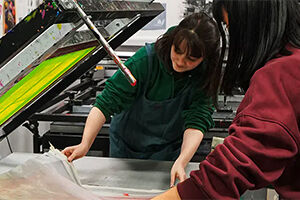
Working in industry
We are proud to work with stakeholders, businesses and artists across Birmingham to enhance the student experience.
Facilities & Staff
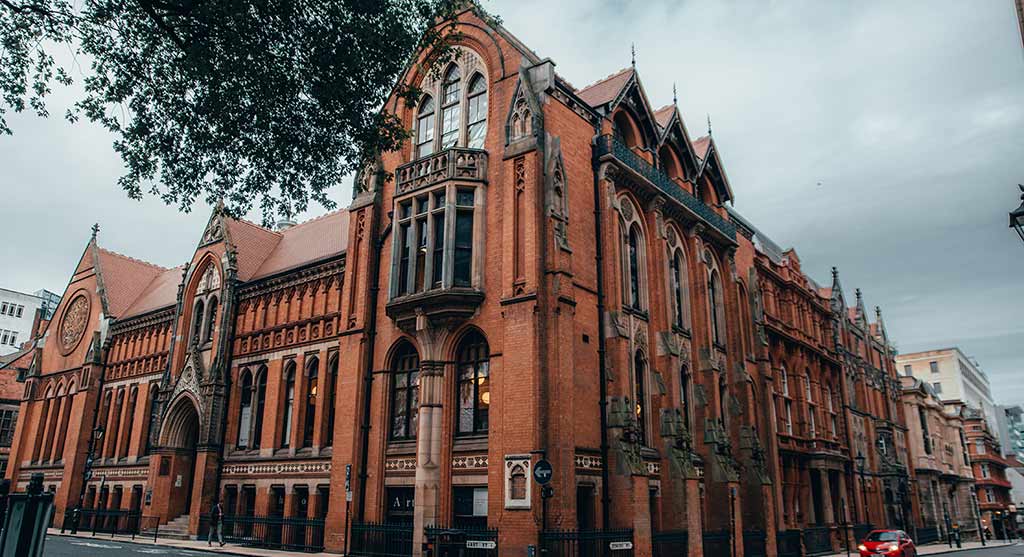
Our Facilities
In 1884 Birmingham Municipal School of Arts and Crafts - the first municipal school in the country, opened at Margaret Street where Birmingham School of Art still stands today. This building, with its rich history and rare heritage of practice-led knowledge, is home to our BA Art and Design course. The School provides an incredible resource for the production of art and design, and its associated fields of study. The building has a range of facilities available including studios, workshops, specialist art and design library, bookable spaces and lecture/seminar rooms.
Our course is situated within an inclusive physical studio environment. This incubator space has making at it’s heart, it is a place of doing, enabling agility and iteration. The layout is flexible and open plan. Like a laboratory, our space brings together the exploration of art, design and creative digital technologies to allow for the necessary collision and serendipity that innovative ideas creation now requires. The layout is loosely divided into Labs, and equipment within the Labs will be on open display and ready to use. These resources will be in addition to the extensive workshops already available in Margaret Street, that include photography, casting, woodwork, metalwork, silk screen, etching, 3D printing, laser cutting, and printed and constructed textiles.
The specialist library, workshops and studio facilities at the School of Art provide a hub of creative activity for you to immerse yourself within.
We're fortunate to have a purpose-built space designed around the course. It allows us to bounce between disciplines and create links between them. We couldn't work as creatively if the studio lacked such freedom to experiment.
Ash Toney, Level 6
Our students utilise specialist kit and software:
Software
- Adobe suite: Illustrator, InDesign, Photoshop, Premiere Pro, After Effects, Animate, Aero
- 3D: Sketch UP, Vectorworks, Unity, Unreal Engine, Blender, Autodesk Maya, Fusion
- Coding: Arduino, Python
Specialist kit in the studio
- 3D Printer
- Knitting Machine and AVL computerised workshop dobby loom with conductive threads
- Arduino kits and Adafruit Circuit boards with sensors
- Robot arm with 6 degrees of freedom, and kinetic robot
- Drone
- Oculus Quest VR headsets
- Midi Keyboards
- Theatre lighting, lighting board and sound control system
- Mac computers
- Projectors
- iPads
- PC Laptops
- Hydrophone with digital recorder
- Xbox Kinect
Our staff
Dr Lara Furniss
BA Art and Design Course Director
Lara has twenty years professional experience working internationally across many art and design disciplines. This extensive cross-disciplinary professional experience directly informs Lara’s teaching, with a primary interest in developing new pedagogic approaches to non-discipline specific problem solving. Lara’s research interests have emerged...
More about LaraSophie Hedderwick
Lecturer of Creative Technologies
Sophie is a multimedia artist/researcher, completing a practice research PhD at BCU, funded by M3C/AHRC. She has worked as a performer, textile designer and media artist, and her practice is a synthesis of the body, technology, and movement. Sophie designs and makes interactive and sensory installations, using photography, film, VR, and haptic...
More about Sophie










